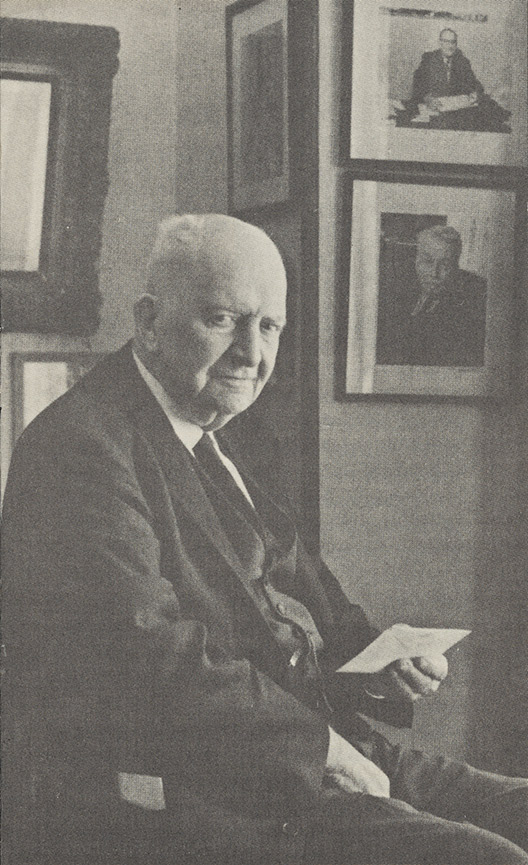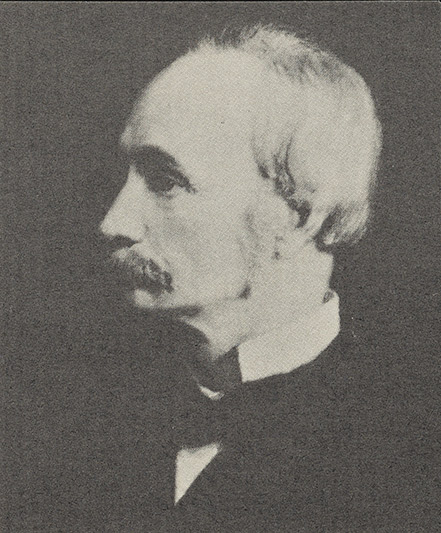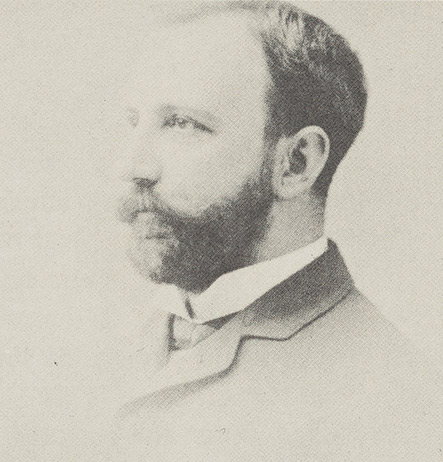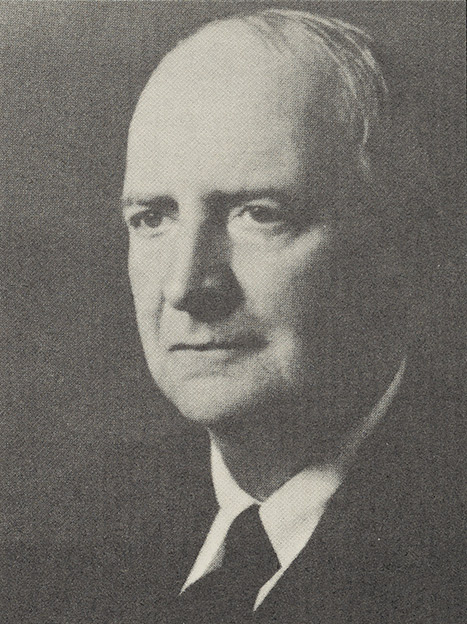A lifetime of teaching and a legacy of scholarships through his fund at The Trust.

Lane Cooper (1875-1959)
“Lane Cooper was, above all, a great teacher, one of the greatest of his generation,” wrote a Cornell colleague. “(In) his classroom . . . new horizons opened to the mind.”
Beneficiary of the genius of two great teachers before him, Cooper also created a triple legacy that extended their influence as well as his own. The first part of the legacy was a lifetime of teaching: 57 years of nurturing students and watching many of them go on to become teachers themselves. The second part was a great body of scholarly works, including more than two dozen books and hundreds of articles. And the third part was the establishment of a scholarship fund to assist “talented but impecunious students,” who might also become teachers one day.
Lane Cooper was born on Dec. 14, 1875, in New Brunswick, New Jersey, where his father, Jacob Cooper, was professor of Greek at Rutgers University (then Rutgers College) and was considered one of the most impressive academic figures of his day. Lane grew up in a rambling Victorian house with his mother, who was Jacob’s second wife, and his older brothers and sisters.

Jacob Cooper’s influence on his son Lane was profound. He passed on to the young man a remarkable scholastic heritage. It was perhaps inevitable that Lane should attend Rutgers University, and that he should study Greek language, literature, and philosophy under his own father. “Apart from the Bible,” Lane later wrote about his father, “his favorite reading throughout a long, laborious life was in Homer and Plato. But he did not neglect Aristotle. In my senior year at Rutgers, we read ‘The Metaphysics’ through; in Greek, be it understood . . . We got from him the notion that a book in Greek or Latin, like a book in English, is a thing that is meant to be read for the substance. That is a notion the pupil does not get from a teacher who cannot read books in the language he professes to teach.”
Jacob Cooper traced his roots to Lancashire, England. The first of the Cooper family to arrive in America were Quakers who came with one of William Penn’s expeditions. They settled in Bucks County, Pennsylvania. Later, the Coopers moved to South Carolina, and one branch of the family joined a wagon train that made the six-week journey through the Cumberland Gap to Butler County, Ohio. In that group was Jacob’s father. Born in 1830, Jacob grew up in poverty, “wrenching a livelihood for his mother out of a reluctant hilly farm,” in Lane Cooper’s words.
But Jacob Cooper was a most unusual farm boy: He possessed an unquenchable thirst for knowledge, coupled with enormous intellectual capacity. His rare gifts awed his family, who managed to get together enough money to send the 21-year-old to Connecticut for an examination at Yale University.
The examiners, with scant sympathy for the backwoods farm boy, asked him, “Have you read any Greek?” a question they apparently thought somewhat ridiculous under the circumstances. “Three thousand pages,” Jacob replied, an apparently ridiculous answer in the examiners’ eyes. “You mean lines,” they corrected. “No, sir,” Jacob replied, “Three thousand pages.” Between farm chores, the boy had accomplished the incredible feat of devouring the bulk of classical Greek literature in the original. The awed examiners admitted Jacob at Yale as a Junior.
Despite the fact that his unusual appearance made him a butt of campus jokes, Jacob distinguished himself as a student during his two years at Yale. “It was his clothes,” a classmate recalled many years later. “They were of wool from sheep raised on his father’s farm, spun, dyed, loomed, and tailored by his own family . . . Cooper’s appearance should not have attracted unwelcome and derisive attention, but it made no difference to him. Unruffled, he calmly wore his genuine homemade woolen suit.” In 1852, he was graduated as a member of Phi Beta Kappa with the highest honors allowed to a student entering as late as the third year.
In the year after his graduation, Jacob Cooper studied theology and philology at home and was licensed in the Presbyterian ministry. During the next two years, he earned advanced degrees both at Yale and at the University of Berlin in Germany. In 1866, after holding a professorship at a college in Kentucky, and after an interruption for service as chaplain to a unit of the Union Army, Jacob was elected Professor of Greek at both Miami University in Oxford, Ohio, and at Rutgers College in New Brunswick, New Jersey. He chose Rutgers and remained there until his death in 1904 at age 74. In the long years following his undergraduate days at Yale, his appearance had changed a great deal. A former pupil said: “He was tall, slender, a little angular, but not ungraceful. He invariably dressed in black, wearing a long frock coat and a bow tie. He had a most benign manner but was capable of intense righteous indignation.”

Before Lane Cooper was born, one of his father’s most promising young students at Rutgers was Albert Stanburrough Cook. Like the Coopers, Cook came from a small farm, and, like them, he possessed exceptional intellectual gifts. With only intermittent schooling, together with a stint at age 15 as a country schoolteacher in New Jersey, Cook graduated from the Latin scientific course at Rutgers at age 19. He was at the head of the Class of 1872 and remained for a year as tutor in mathematics. After a few years of private and foreign study, and upon the recommendation of his former professor of Greek, Jacob Cooper, Cook received an appointment at Johns Hopkins University. Then, in 1899, he was called to Yale as Professor of the English Language and Literature, where he remained for 32 years. One of his outstanding students at Yale was Lane Cooper, the son of his former professor.
Lane Cooper was graduated from Rutgers with a Bachelor of Arts in 1896. For a time, it seemed he would not follow in his father’s footsteps. He enrolled at the College of Physicians and Surgeons at Columbia University. But the study of medicine turned out not to be to his liking, and after a year, he transferred to the Yale Graduate School for the study of English literature under Albert Stanburrough Cook. He was awarded a Master of Arts degree in 1898.
Lane taught for a year at the College of St. James, a preparatory school near Hagerstown, Maryland, then went back to his studies—first in Germany, where he received a doctorate in English philology at Leipzig in 1901, then in France at the College de France in Paris.
In the spring of 1902, Lane returned to the United States and accepted an instructorship at Cornell University. Encouraged by the head of his department to create a course of his own, Cooper developed a course on Wordsworth. Soon he had built an entire program of courses, becoming a one-man institute within his department.
His climb up the academic ladder was sure: assistant professor in 1906; professor in 1915; in 1927 in charge of his own department, which he called “the comparative study of literature,” without giving up his title as Professor of the English Language and Literature or his chief commitment to the training of graduate students to teach English. Cooper was appointed John Wendell Anderson Professor of English from 1941 to 1943, when he became professor emeritus.
Cooper never married. He was most at home in his classroom, and his life was centered almost wholly on his students, who rewarded his devotion with evidence of their intellectual awakening and development. Lane Cooper had a way of stimulating above-average interest and achievement in students of only average aptitude, leading them to a fuller appreciation of the value of literature and learning and mental discipline. But Cooper’s real gift was in his work with superior students, whom he encouraged with almost missionary zeal to continue their studies.

Lane Cooper was no mere lecturer, no transmitter of scholarly data. His classroom was an exciting place, where intellectual tension fairly crackled. His students always felt free to express their thoughts, discussion was lively, and Cooper considered himself most successful as a teacher when he was exploring ideas that were new to him as well as to his students.
Believing that an effective teacher also must be a productive scholar, Lane studied and wrote prolifically throughout his career. His concordances of Wordsworth, Boethius, and the Latin poems of Milton have received much acclaim. Of his 27 books, some of them collections from nearly 200 articles and reviews, a great many were related to the courses he taught.
As highly as he valued the study of the classics in their original versions, he was among the first to understand that it was unfair to deny them to students who had not mastered the language of the original. For the many students who would never know enough Greek to read Aristotle but who could benefit from the philosopher’s wisdom, Lane translated Aristotle’s “The Poetics” and “Rhetoric,” and a number of the dialogues of Plato. He built a course in the classics around these translations, many of which are still widely used.
In addition to impeccable scholarship, Lane Cooper’s work exhibits a finely honed literary style. As a young man, he often considered becoming a writer, and his talent showed clearly in his essays and addresses on educational, moral, and literary subjects. His was a position of inspired—and inspiring—conservatism in a period of education marked by novelty and experiment.
For over half a century, Lane Cooper was a familiar figure on the Ithaca campus. Nearly every evening, he visited the university library, clearing his throat and exchanging a few words with those he knew. Generations of students cherish the memory of late-night chats over coffee with the silver-haired Dr. Cooper, who whittled matches into toothpicks as he talked.
After Lane Cooper’s death on Nov. 27, 1959, at age 84, one of his former students, who had become a faculty colleague, wrote this tribute: “There was a magnetism in his personality. He invested everything he did with an aura of importance; he radiated interest and enhanced the value of life.”
His will established the Lane Cooper Fund, which has provided scholarships to students at schools such as Cornell, Columbia, NYU, and Rutgers.